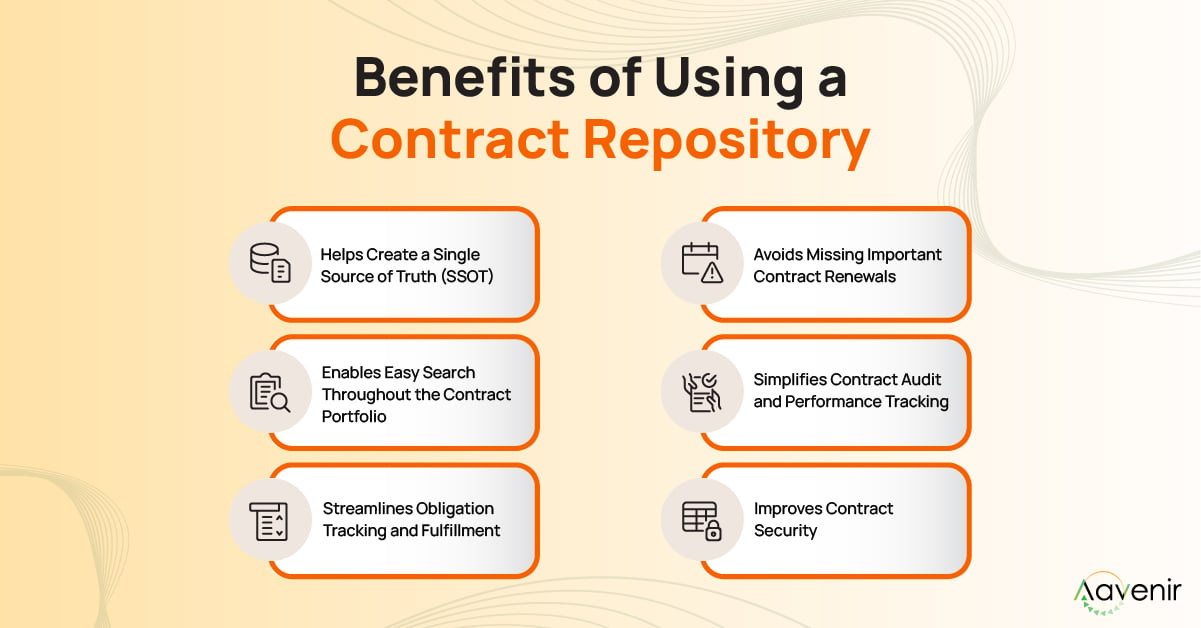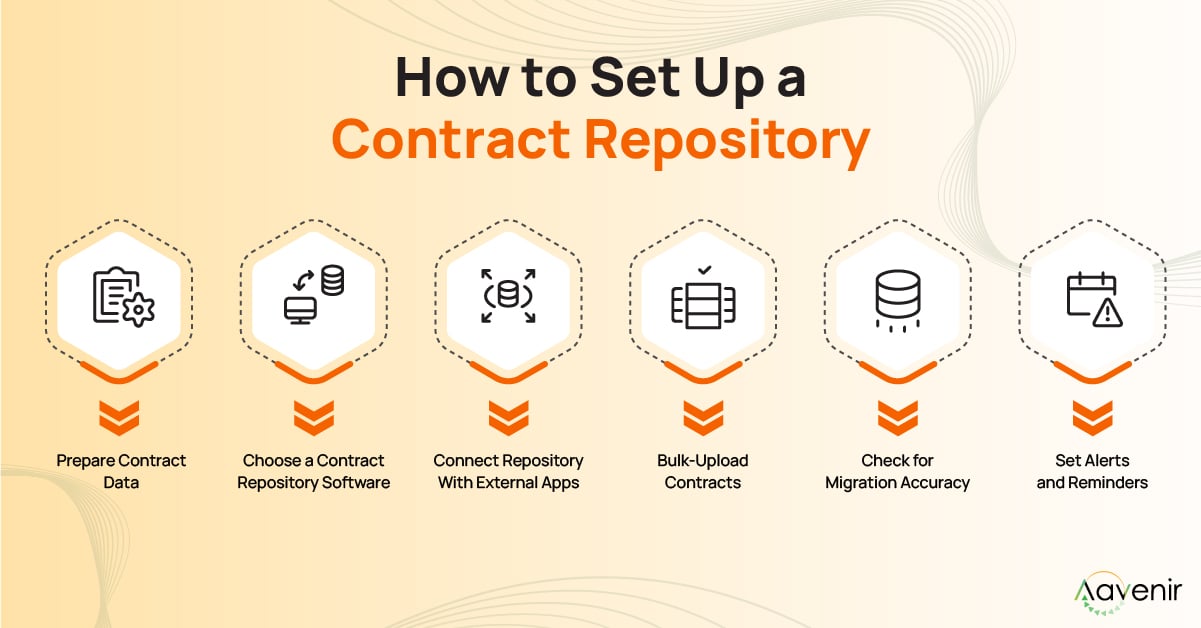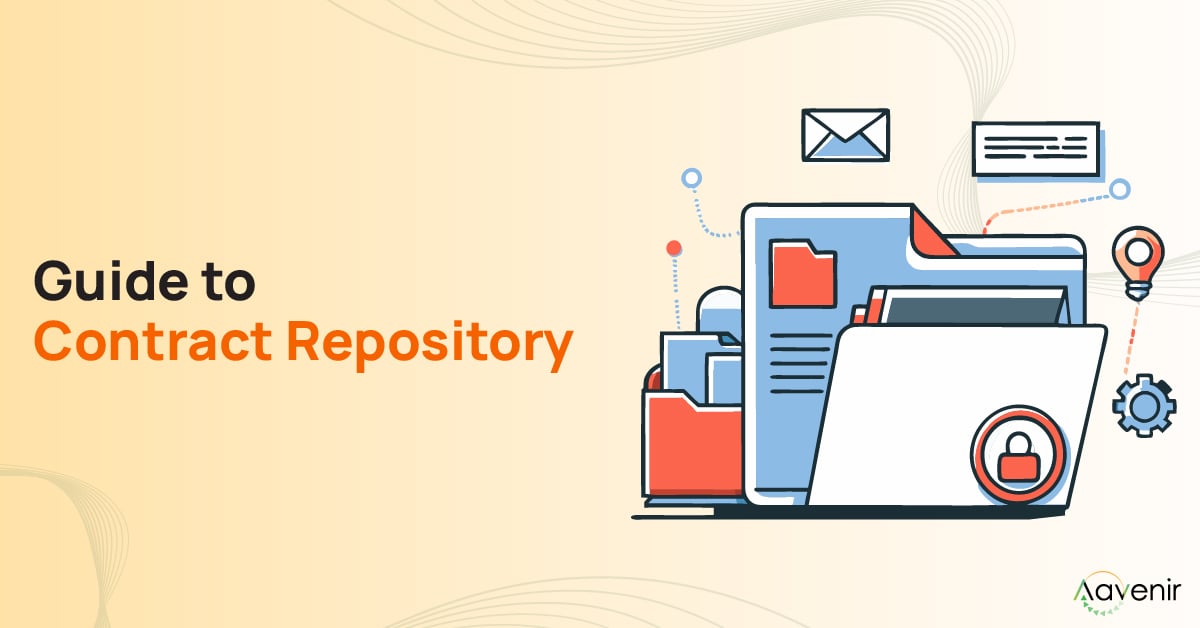In today’s fast-paced business environment, managing contracts efficiently can be the difference between capturing value or creating risk. For organizations juggling hundreds or thousands of agreements, a robust contract repository isn’t just a nice-to-have—it’s a critical business asset. But what exactly is a contract repository, and how can you build one that truly serves your organization’s needs?
What Is a Contract Repository?
A digital contract repository is a centralized system designed specifically for storing, organizing, managing, and analyzing all of an organization’s contracts throughout their lifecycle. Unlike basic document management systems or folder structures, a proper contract repository doesn’t just store documents—it transforms contracts into searchable, analyzable data that drives business intelligence.
Modern contract repositories serve as the backbone of effective contract lifecycle management, providing features like:
- Secure, centralized contract storage
- Advanced search and filtering capabilities
- Automated metadata extraction
- Contract analytics and reporting
- Obligation and compliance tracking
- Automated alerts for key dates and milestones
- Role-based access controls
The most advanced contract repositories leverage artificial intelligence to automatically extract key contract data points, identify risks, and provide insights that would be impossible to gather manually.
Traditional Contract Storage vs. Modern Repositories
To understand the value of a proper contract repository, it helps to compare it with traditional storage methods many organizations still use today:
| Aspects | Modern Repositories | Traditional Storage |
|---|---|---|
| Centralization | Single source of truth with all contracts in one system | Scattered across physical files, shared drives, email, and personal computers |
| Searchability | Powerful search across all contract text, metadata, and obligations | Manual review of files or basic keyword search at best |
| Manual Work | Automation reduces data entry and information extraction | Heavy manual processing and data entry |
| Contract Visibility | Complete visibility across the entire contract portfolio | Limited visibility with information silos |
| Obligation Management | Automated tracking of deadlines, obligations, and renewals | Manual calendaring with high risk of missed deadlines |
| Audit Readiness | Instant reporting and audit trail available on demand | Time-consuming preparation for audits |
| Security | Role-based access controls and enterprise-grade security | Inconsistent protection and unclear access management |
The limitations of traditional contract storage methods become particularly problematic as organizations grow. Manual repositories and spreadsheet tracking simply don’t scale, creating increasing risk and inefficiency over time.
6 Reasons Why Every Business Needs a Smart Contract Repository
A central contract repository ensures that teams across legal, procurement, and finance are aligned with consistent, up-to-date contract information.

1. Helps Create a Single Source of Truth (SSOT)
Modern business requires cross-functional collaboration across legal, procurement, finance, and operations teams. A contract repository creates a single source of truth for contract information, eliminating version control problems and ensuring everyone works with accurate, up-to-date data. No more wondering if you’re looking at the final signed version or an outdated draft.
2. Enables Easy Search Throughout the Contract Portfolio
With AI-powered search capabilities, modern contract repositories make it possible to find specific clauses, terms, or obligations across thousands of contracts in seconds. This level of searchability transforms how teams can respond to regulatory compliances, analyze risk exposure, or identify negotiation opportunities.
Need to check all contracts affected by a new regulation? Want to find every agreement with a specific force majeure clause? A smart repository makes this possible with just a few clicks, rather than weeks of manual review.
3. Streamlines Obligation Tracking and Fulfillment
Every contract contains obligations—things your organization must do (or avoid doing) to remain compliant. A robust digital contract repository automatically extracts these obligations and enables systematic tracking to ensure nothing falls through the cracks.
This automated approach to obligation tracking and management not only reduces compliance risks but also helps capture value that might otherwise be lost, such as volume discounts or performance incentives built into agreements.
4. Avoids Missing Important Contract Renewals
Missed renewal dates can lead to unwanted auto-renewals, loss of negotiation leverage, or business disruption. Contract repositories provide automated alerts for upcoming renewal dates and other key contract milestones, giving teams the time they need to make informed decisions rather than rushed reactions.
5. Simplifies Contract Audit and Performance Tracking
When auditors come knocking or executives request contract performance analysis, a centralized repository makes reporting fast and accurate. Contract analytics capabilities allow teams to assess vendor performance, compare contract terms across the portfolio, and identify optimization opportunities systematically.
6. Improves Contract Security
Contracts often contain sensitive data and confidential information that requires careful protection. Modern contract repositories provide enterprise-grade security with role-based access controls, ensuring that only authorized personnel can view specific contracts or data. This level of security is nearly impossible to maintain with manual repositories or shared drives.
Find Any Contract in Seconds—Not Hours
Aavenir’s smart repository, custom filters, and AI search help find the clause or contract you need instantly—ensuring quick, effortless contract retrieval.
4 Must-Have Qualities for a High-Performing Contract Repository
When evaluating or building a contract repository, ensure it meets these essential requirements:
1. Searchable
Your repository must offer sophisticated search capabilities beyond basic keywords. Look for solutions that enable:
- Full-text search across all contract documents
- Filtering by multiple metadata fields
- Clause-level searching
- Saved and shareable searches
2. Secure
Contract security is non-negotiable. Your repository should provide:
- Role-based access controls
- Encryption for data at rest and in transit
- Detailed audit trails of system access
- Compliance with relevant security standards
- Data backup and disaster recovery options
3. Accessible
The value of a contract repository comes from its use. Ensure your solution offers:
- Intuitive user interface requiring minimal training
- Mobile access for on-the-go professionals
- Integration with existing systems (CRM, ERP, etc.)
- Configurable dashboards for different user roles
- Export capabilities for reporting
4. Centralized
True centralization means eliminating contract silos. Your repository should:
- Accommodate all contract types and formats
- Provide a consistent structure for all agreements
- Enable cross-referencing between related contracts
- Standardize metadata across the organization
- Serve as the authoritative source for all contract database
Get 5X Better Visibility Over Contracts
Experience smarter storage, better compliance, and faster contract access with Aavenir’s AI-powered contract repository.
Step-by-Step: How to Build Your Contract Repository the Right Way

Creating an effective contract repository requires careful planning and execution. Follow these steps for successful implementation:
1. Prepare Contract Data
Before migrating to a new system:
- Inventory all existing contracts across the organization
- Establish consistent metadata standards
- Define your contract categories and types
- Create a data governance policy
- Identify high-priority contracts for initial migration
This preparation work is crucial—the quality of your repository depends on the quality of data you put into it.
2. Choose a Contract Repository Software
Select a contract repository solution that meets your specific needs:
- Consider your contract volume and complexity
- Evaluate integration requirements with existing systems
- Assess security and compliance requirements
- Determine needed automation features
- Consider scalability for future growth
Look for contract management solutions if you need comprehensive lifecycle management beyond just storage.
3. Connect Repository With External Apps
Maximum value comes from connecting your contract repository to other business systems:
- Integration with e-signature platforms
- Connections to procurement and vendor management systems
- ERP and financial system integration
- CRM synchronization for customer contracts
- HRIS integration for employment agreements
These connections eliminate duplicate data entry and create workflow efficiencies across departments.
4. Bulk-Upload Contracts
With preparation complete, begin uploading contracts:
- Use automated tools for bulk migration when possible
- Apply consistent metadata during the upload process
- Leverage AI for contract data extraction from legacy documents
- Prioritize active contracts for immediate accessibility
- Tag contracts appropriately for easy categorization
Modern contract repository systems can automatically extract key information during the upload process, reducing manual data entry.
5. Check for Migration Accuracy
Quality control is essential:
- Verify metadata accuracy for a sample of migrated contracts
- Confirm search functionality returns expected results
- Validate that all document versions migrated correctly
- Test access controls to ensure proper permissions
- Verify automated data extraction accuracy
Take time to correct any issues before proceeding to full implementation.
6. Set Alerts and Reminders
Configure the system to provide proactive notifications:
- Set up renewal alerts with appropriate lead time
- Configure obligation reminders for key stakeholders of key contract dates such as renewals, expiries, and milestones
- Establish escalation paths for unaddressed items
- Create regular reporting schedules
- Enable milestone tracking for long-term agreements
These automated alerts transform your repository from passive storage to an active management tool.
Opting for a cloud based contract repository reduces infrastructure costs, enhances accessibility, and ensures quicker deployment compared to on-premise systems
Manage Contracts Using AI With Aavenir’s Smart Contract Repository
A digital contract repository provides a centralized document location, eliminating silos and making it easier for stakeholders to find, review, and act on contractual information.
Aavenir’s AI-powered contract management software takes CLM efficiency to the next level by addressing the core challenges organizations face with contract visibility and compliance tracking.
Our solution provides:
- AI-Powered Data Extraction: Automatically identifies and extracts over 70+ standard contract data points
- Intelligent Search: Find any term, clause, or obligation across thousands of contracts instantly
- Contract Insights: Get a quick overview of your top contracts by value, type, and vendor—along with visibility into contract expiry dates and version history
- Seamless Integration: Connects with existing enterprise systems for unified workflows
- Automated Obligation Extraction: Never miss a deadline or requirement again
- Customizable Dashboards: Tailored views for different stakeholders and departments
By centralizing contracts in Aavenir’s repository, organizations typically reduce contract retrieval time by 85% and improve compliance management by over 60%. The platform serves as both a secure document repository and a strategic asset for contract intelligence.
In today’s complex business environment, effective contract management software isn’t optional—it’s essential for controlling risk and maximizing value. A robust contract repository forms the foundation of successful contract lifecycle management, providing visibility, control, and intelligence that traditional storage methods simply cannot match.
By implementing a proper contract repository, organizations transform contracts from static documents into strategic assets that drive better business decisions and outcomes. Whether you’re managing hundreds or thousands of agreements, the right repository solution can revolutionize how your organization handles contracts across their entire lifecycle.
Ready to see how Aavenir’s contract repository can transform your contract management processes? Book a demo today and experience the difference that true contract intelligence can make.
Frequently Asked Questions
Can we migrate old contract data into a contract repository?
Yes, most contract repository solutions offer migration tools to import existing contracts. Advanced systems leverage AI to extract key data points from legacy documents and use OCR to digitize and interpret scanned physical contracts. Importantly, a human-in-the-loop approach ensures all extracted information is manually reviewed for accuracy, minimizing errors and maintaining data integrity. While migration requires upfront planning, the long-term benefits far outweigh the initial effort.
How to ensure contract security in an agreement repository?
Modern contract repositories employ multiple security layers, including encryption, role-based access controls, and detailed audit trails. Look for solutions that comply with industry standards like SOC 2, offer data backup options, and provide granular permission settings. These measures ensure sensitive data remains protected while still allowing appropriate access to authorized users.
Do contract repositories send reminders for renewals or expiries?
Yes, automated alerts for key dates are a standard feature in quality contract repositories. These systems can be configured to send notifications to specific stakeholders at predetermined intervals before renewal, expiration, or other critical dates. This functionality helps organizations avoid missed contract renewals, secure better terms through timely renegotiation, and prevent unwanted auto-renewals.
How long does it take to set up a contract repository?
Implementation timelines vary based on contract volume, data complexity, and integration requirements. Basic setup can be completed in a few weeks, while enterprise-wide implementation with extensive integration might take 2-3 months. Cloud-based solutions generally deploy faster than on-premise options. Working with experienced providers like Aavenir can significantly accelerate implementation while ensuring proper configuration.





